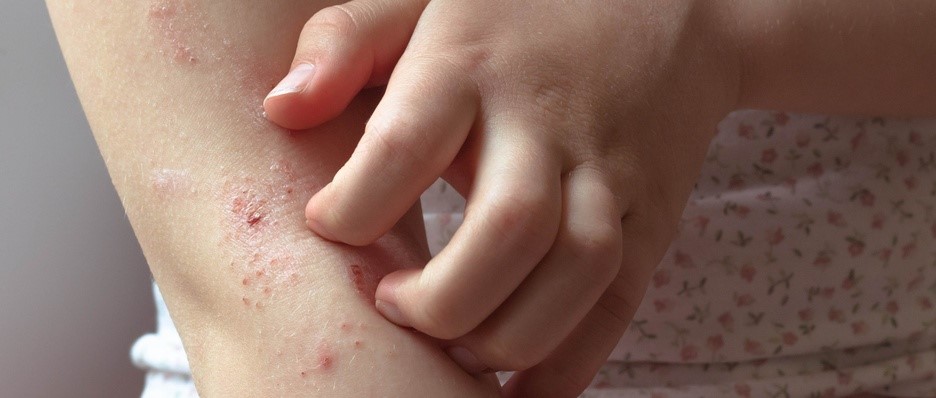
Eczema management plans: do they help control your eczema?
Peer reviewed by Dr Colin Tidy, MRCGPLast updated by Dr Sarah Jarvis MBE, FRCGPLast updated 7 Apr 2021
Meets Patient’s editorial guidelines
- DownloadDownload
- Share
- Language
- Discussion
- Audio Version
Poorly controlled eczema can make you or your child feel miserable, generally unwell, grumpy and uncomfortable, even if you don't have a flare-up. So it's not surprising that we're always hunting for something that will help relieve both flare-ups and day-to-day misery - and an eczema management plan could help do just that.
In this article:
Video picks for Eczema
Atopic eczema is the most common kind of eczema - most people just refer to eczema when they're talking about atopic eczema. 'Atopic' means that you have a tendency to certain allergic conditions - people with atopic eczema are more prone to asthma and hay fever too.
Eczema is a form of dermatitis - inflammation of the skin. Symptoms range from the occasional patch of dry skin to widespread itchy, painful, inflamed and thickened skin. If the sometimes unbearable itching wasn't bad enough, scratching can lead to cracking and breaking of the skin. This makes it easier for infection to spread under the skin, leading to hot, angry, red and inflamed areas which can bleed and weep. And persistent itching can also cause the skin to thicken.
Continue reading below
What is an eczema management plan?
Sometimes called an action plan, management plans are used in a wide variety of long-term conditions, including asthma, COPD and diabetes. For all these conditions, your external environment - what you're in contact with, what you eat, the weather - can have an effect on your symptoms.
For conditions like asthma, the evidence for management plans is so strong that they're routinely recommended for all children and adults to help reduce the risk of serious, sometimes life-threatening flare-ups. Management plans for eczema have taken longer to become mainstream. This is possibly because some doctors don't perceive eczema as being as 'serious' as asthma. This ignores the huge impact on quality of life that sub-optimally controlled eczema can have.
An eczema management plan is tailored to look at all the individual circumstances that can affect your child, including triggers, signs that their condition isn't well controlled and what symptoms suggest a serious flare-up that needs medical input. It includes guidance on:
What treatments to use routinely.
How, and how often, to use treatments.
When and how treatment needs to be stepped up.
What treatment to use in which situations; and
When to seek medical help.
Do eczema management plans work?
Back to contentsThe evidence in favour of eczema management plans is compelling. In trials, management plans allow parents to understand their child's condition, and the treatment they need, much better.
An eczema management plan helps you and your doctor identify situations and symptoms where you need to take action to avoid or minimise flare-ups. By working with your doctor to develop it, you effectively carry your doctor around with you all the time.
Managing your child's eczema is often complicated and time-consuming. Applying emollient creams really regularly can significantly improve eczema control and reduce the chance of flares. But children may be very vocal in their reluctance to have their fun interrupted to have creams applied regularly. What's more, it can be difficult to spot the early signs of a flare, and you may be reluctant to step up treatment too quickly.
Given the time involved in applying creams and the confusion over what needs doing when, it's hardly surprising that even with simple eczema treatment regimens, more than 2 in 3 parents don't use their child's treatment exactly as it's recommended.
In studies, having an eczema management plan was rated as helpful almost 90% of the time by parents who had one. The same proportion believed it was helpful in clarifying which medications to use when their child had a flare-up. And of children whose eczema improved, more than 2 in 3 parents said the management plan played a role.
Continue reading below
How can I improve my child's eczema?
Back to contentsThe most effective ways to help your child keep their eczema under control are:
To recognise (and avoid) triggers.
To use prescribed treatment regularly.
To react to exacerbations promptly, stopping them from leading to major flares.
To know when to seek medical help promptly.
As a parent of a child with eczema, there are certain tools that can help you identify and track triggers. The symptoms caused by triggers can be discussed with the doctor and incorporated into a management plan. This in turn can give you the confidence to adapt treatment when needed at an early stage, reducing distress and cutting the need for emergency medical consultations.
Most of these involve tracking symptoms or regular prompts to apply treatments. But written diaries of symptoms can be inconvenient, which means they're less likely to be used. In the 21st century, when virtually all of us carry our mobile phones with us more often than we carry our house keys, a mobile phone app that allows us to take all the necessary steps in one always accessible place can be invaluable.
The free Living with Eczema app, produced by Alliance Pharmaceuticals Ltd, is one such app. It provides:
Tips and advice, including links to national organisations such as the National Eczema Society and the British Skin Foundation.
A photo journal.
A skin diary.
Information on treatment options and how emollients work.
Treatment reminders.
Appointment reminders.
Prescription reminders.
Given how children often find the process of regularly applying creams challenging, the interactive element that helps children to manage their eczema is welcome. Using different characters showing where and how much emollient should be applied to the different parts of their body can help keep little ones engaged in managing their own eczema.
All of these can help you develop a management plan and keep on top of your child's treatment.
Keeping a symptom diary
Back to contentsIf your child has atopic eczema, you may well find that their symptoms are triggered by things they're allergic to or intolerant of - pollen, animals, irritants or foods. If this is the case, avoiding or minimising those triggers can be crucial - but to help them avoid their triggers, you need to know what they are.
This is where a symptom diary can be invaluable - both for yourself or for discussing your child's condition with their doctor or nurse. It's helpful to keep a regular log of:
What symptoms your child developed.
How long they lasted for.
What your child was doing around the time they started (whether they had been outside in the countryside, in contact with a dog, eating certain food etc); and
What action you took (taking an antihistamine, applying moisturising cream etc) and what effect it had.
This will allow you to start to build up a pattern. This in turn can help you and your doctor develop a management plan of what to avoid where possible and what steps to take in different situations.
Continue reading below
Keeping a photo diary
Back to contentsIf a new or existing patch of eczema becomes rapidly worse - red, inflamed, hot, itchy and/or weeping - it may be due to an infection under the skin. Sometimes, however, flare-ups can be down to triggers your child has been in contact with.
A photo diary allows you to track how your child's condition is progressing, the impact of triggers and the improvements which come with different treatments.
Reminders
Back to contentsWe all have busy lives - and that means we all get distracted. That doesn't mean we care any less for our children - it just means we're human. When treatment is complicated - twice a day application of one cream, four times a day of another, tablets every morning - it's incredibly easy to get confused or distracted. An app which provides regular reminders of what treatment to take or apply when, can significantly improve the regularity of treatment and optimise its effect.
Of course, you can't give your child their treatment if your prescription has run out. A prescription reminder, which prompts you to send in a medication request, reduces the risk of this. And an appointment reminder, which sends you notifications, makes it less likely that you'll miss a follow-up appointment.
Patient picks for Eczema

Skin, nail and hair health
Why eczema itches - and how to stop it
Itchiness is one of the most uncomfortable symptoms of eczema - and the urge to scratch can be unbearable. Itchy skin can also lead to sleep problems and make it hard to concentrate, but scratching can make the skin feel sore and lead to infections. So what can you do to ease the itchiness of eczema?
by Lydia Smith

Skin, nail and hair health
Why we need better care for people with eczema
Atopic eczema, the most common form of the skin condition eczema, affects one in five children and one in ten adults in the UK. Not only does it cause the skin to become itchy, sore, dry and cracked, the discomfort and appearance can lead to considerable psychological distress - affecting people's sleep, work and more. Despite this, many people with eczema wait many months for treatment and suffer in silence.
by Lydia Smith
Continue reading below
Article history
The information on this page is peer reviewed by qualified clinicians.
7 Apr 2021 | Latest version

Ask, share, connect.
Browse discussions, ask questions, and share experiences across hundreds of health topics.

Feeling unwell?
Assess your symptoms online for free
Sign up to the Patient newsletter
Your weekly dose of clear, trustworthy health advice - written to help you feel informed, confident and in control.
By subscribing you accept our Privacy Policy. You can unsubscribe at any time. We never sell your data.